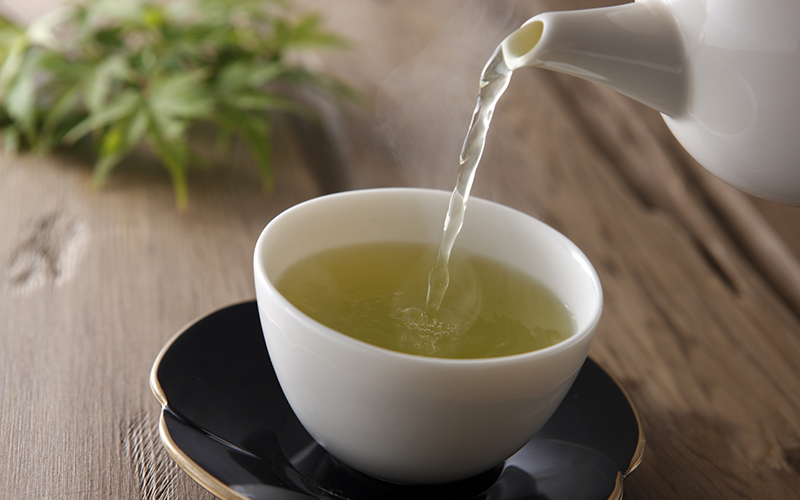
by guest blogger Caroline Praderio, food and nutrition writer for Prevention magazine and EatClean.com
Ask a prominent researcher about the proven health benefits of green tea, and you might get a disappointing answer: “There are none really,” says David Katz, MD, founder of Yale University’s Prevention Research Center.
Wait, what?! Haven’t you read tons of articles saying green tea can do everything from cure Parkinson’s to fight cancer and even prevent cavities? Yes, you have. There are literally thousands of respectable, published research papers on the health benefits of green tea—there’s just no hard evidence, per se, to definitively prove that green tea can actually cure cancer or Parkinson’s (no big surprise there).
So what has the brew been proven to do? Here’s everything you need to know:
1. Green tea actually can boost your heart health.
Luckily, there is one area where green tea seems to work across the board, in cell, animal, and tons of human studies: “Tea consumption really does reduce blood pressure,” says Jeffrey Blumberg, PhD, senior scientist at Tufts University’s Antioxidants Research Laboratory and former chairman of the International Scientific Symposium on Tea and Human Health. (Researchers think it’s because tea helps relax blood vessels throughout the body.) But the effect is modest, not dramatic. If your blood pressure is dangerously high, a few cups of green tea per day won’t restore healthy BP levels—Blumberg explains you’re likely to shave just a few points off of both the systolic and diastolic measures. “But anything that helps Americans achieve a somewhat lower blood pressure is a good thing,” he says.
2. Don’t believe everything you read.
A lot of the splashiest headlines about green tea research don’t come from studies of people drinking actual tea—they’re done using cells or animals injected with super-high doses of compounds isolated from green tea. (One that gets a lot of attention is EGCG, or epigallocatechin gallate, an antioxidant that’s been studied in relation to Alzheimer’s, Parksinson’s, and several cancers.) While this type of research is certainly applicable to lab rats, experts say it’s likely not applicable to you and your daily afternoon cup: “Green tea has lots of healthy things in it, but that doesn’t mean every healthy molecule in there is going to translate to a health benefit in your body,” Blumberg says.
In other words: Make sure to take new research on isolated green tea compounds with a big grain of salt.
3. What you drink may be just as important as what you don’t drink.
Sure, green tea appears to benefit the human body in thousands of studies. But what if it’s not actually the tea doing the heavy lifting for your health? That’s the “green tea instead of what?” question, explains Katz: “Benefits from drinking green tea may, indeed, be benefits of drinking green tea. But they could also be the benefits of avoiding soda. Green tea may do good because of what is in it, what isn’t in it, or both.” The frustrating thing is that we don’t really know yet. As of today, says Katz, we still don’t have enough studies that truly isolate the effects of green tea from other factors that could influence health.
4. Hot, caffeinated tea is healthiest (no sugar allowed).
Some of green tea’s healthy flavonoids—the compounds believed to be responsible for its heart health benefits—get destroyed during the decaffeination process, so if you choose decaf, brew a stronger cup or have two cups instead of one, says Blumberg. And if you’re an iced tea drinker, make sure you brew it fresh: Flavonoids degrade with time, so storing a huge pitcher in the fridge for a week means the last few cups won’t be as potent. “And bottled, ready-to-drink teas don’t have very many, if any, of these flavonoids,” he adds. Finally, stay away from the sweet stuff. “If it’s pure green tea, great. Once sweeteners are added, it’s a different proposition altogether,” Katz says.
5. Supplements are bad news.
Highly concentrated green tea pills can do a number on your liver: In 2014, the American College of Gastroenterology released new guidelines warning customers to steer of clear of weight loss supplements containing green tea extract, since it’s one of the most common ingredients associated with drug-induced liver injury. (And since supplements aren’t regulated by the FDA, the pills may contain a different amount of green tea extract than the bottle claims.) Plus, they don’t have much solid research behind them: “The weight loss benefits of green tea are exaggerated by the media and supplement makers,” says Sharon Palmer, RDN, author of The Plant Powered Life. “And if it does boost your metabolism, it’s at very low levels.”
6. Every expert still thinks you should drink it.
Even if there’s a lot we don’t know, every expert we talked to recommends unsweetened tea as a smart choice—especially if it takes the place of a different beverage like soda. “I am perfectly happy to tell you that tea is a healthful beverage choice, and I feel that there is a body of scientific evidence to say that it is really a good thing,” Blumberg says. “You can drink this now while you wait for me to do more research in the future.”
 Caroline Praderio is the food and nutrition writer for Prevention magazine and EatClean.com. A native of Massachusetts, she’s a graduate of Emerson College and a winner of two International Regional Magazine Association awards. When she’s not writing, she loves to read, cook, and rehearse with her dance company.
Caroline Praderio is the food and nutrition writer for Prevention magazine and EatClean.com. A native of Massachusetts, she’s a graduate of Emerson College and a winner of two International Regional Magazine Association awards. When she’s not writing, she loves to read, cook, and rehearse with her dance company.
Adapted from the article “6 Ways to Actually Get Any Health Benefits from Green Tea,” originally published on EatClean.com




like